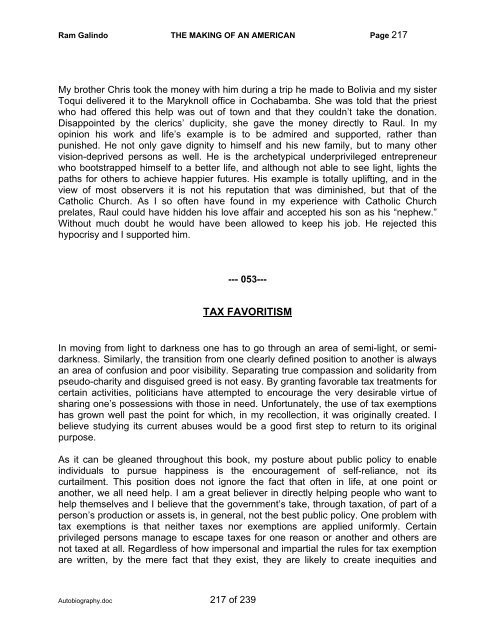Autobiography - The Galindo Group
Autobiography - The Galindo Group
Autobiography - The Galindo Group
You also want an ePaper? Increase the reach of your titles
YUMPU automatically turns print PDFs into web optimized ePapers that Google loves.
Ram <strong>Galindo</strong> THE MAKING OF AN AMERICAN Page 217<br />
My brother Chris took the money with him during a trip he made to Bolivia and my sister<br />
Toqui delivered it to the Maryknoll office in Cochabamba. She was told that the priest<br />
who had offered this help was out of town and that they couldn’t take the donation.<br />
Disappointed by the clerics’ duplicity, she gave the money directly to Raul. In my<br />
opinion his work and life’s example is to be admired and supported, rather than<br />
punished. He not only gave dignity to himself and his new family, but to many other<br />
vision-deprived persons as well. He is the archetypical underprivileged entrepreneur<br />
who bootstrapped himself to a better life, and although not able to see light, lights the<br />
paths for others to achieve happier futures. His example is totally uplifting, and in the<br />
view of most observers it is not his reputation that was diminished, but that of the<br />
Catholic Church. As I so often have found in my experience with Catholic Church<br />
prelates, Raul could have hidden his love affair and accepted his son as his “nephew.”<br />
Without much doubt he would have been allowed to keep his job. He rejected this<br />
hypocrisy and I supported him.<br />
--- 053---<br />
TAX FAVORITISM<br />
In moving from light to darkness one has to go through an area of semi-light, or semidarkness.<br />
Similarly, the transition from one clearly defined position to another is always<br />
an area of confusion and poor visibility. Separating true compassion and solidarity from<br />
pseudo-charity and disguised greed is not easy. By granting favorable tax treatments for<br />
certain activities, politicians have attempted to encourage the very desirable virtue of<br />
sharing one’s possessions with those in need. Unfortunately, the use of tax exemptions<br />
has grown well past the point for which, in my recollection, it was originally created. I<br />
believe studying its current abuses would be a good first step to return to its original<br />
purpose.<br />
As it can be gleaned throughout this book, my posture about public policy to enable<br />
individuals to pursue happiness is the encouragement of self-reliance, not its<br />
curtailment. This position does not ignore the fact that often in life, at one point or<br />
another, we all need help. I am a great believer in directly helping people who want to<br />
help themselves and I believe that the government’s take, through taxation, of part of a<br />
person’s production or assets is, in general, not the best public policy. One problem with<br />
tax exemptions is that neither taxes nor exemptions are applied uniformly. Certain<br />
privileged persons manage to escape taxes for one reason or another and others are<br />
not taxed at all. Regardless of how impersonal and impartial the rules for tax exemption<br />
are written, by the mere fact that they exist, they are likely to create inequities and<br />
<strong>Autobiography</strong>.doc 217 of 239


